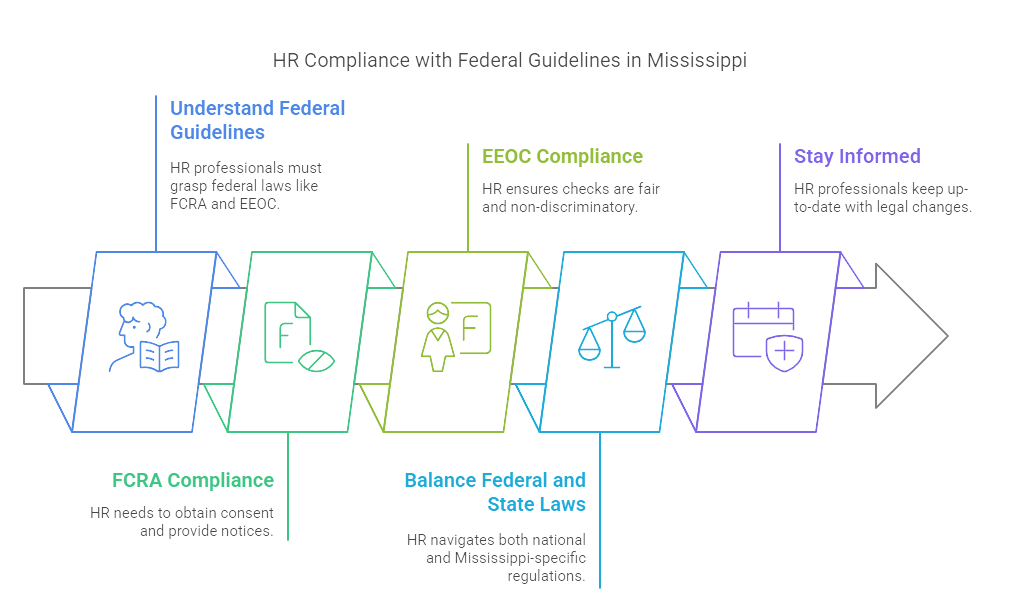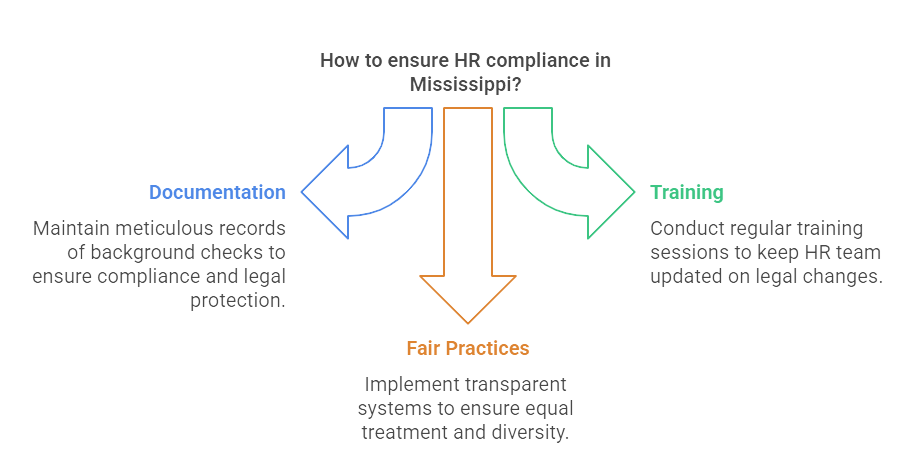Navigating the legal landscape of hiring can be daunting, especially when it comes to conducting background checks. For HR professionals in Mississippi, understanding the specific state laws governing employment screenings is crucial for ensuring compliance and avoiding potential legal pitfalls. This guide will help you grasp the essentials of Mississippi background check laws, offering insights into best practices for seamless and legally sound HR management.
Key Takeaways
- Background checks in Mississippi require a nuanced understanding of both state-specific laws and federal regulations, such as the Fair Credit Reporting Act (FCRA), to ensure compliance and fair hiring practices.
- Mississippi's employment screenings emphasize the need for written consent, fairness, and transparency, demanding HR professionals to incorporate legal stipulations into their processes to avoid liabilities.
- HR teams must be well-versed in balancing Mississippi's unique requirements with federal guidelines, focusing especially on avoiding discrimination as dictated by the Equal Employment Opportunity Commission (EEOC).
- Best practices for compliance include meticulous documentation, regular HR training on legal updates, and implementing fair employment frameworks to create an equitable hiring environment.
- Challenges in employment screening revolve around maintaining data security, keeping up with evolving laws, and handling disputes, necessitating regular process audits and continuous learning to mitigate legal risks.
Introduction
Background checks are more than a routine step in hiring; they are a critical component of ensuring the right fit between employers and candidates. For employers, these checks provide a level of trust and security by verifying a candidate's qualifications and history. For candidates, they serve as a gatekeeping tool that can significantly impact their employment opportunities, highlighting the importance of transparency and fairness.
In Mississippi, conducting background checks involves navigating a complex landscape where state-specific concerns intertwine with national regulations. The state has its own legal peculiarities, requiring HR professionals to be particularly astute in their understanding of both Mississippi’s distinctive employment laws and how these laws mesh with overarching federal guidelines like the Fair Credit Reporting Act (FCRA). Understanding this intersection is essential for ensuring compliance and fostering an equitable hiring process.
EXPERT INSIGHT: As a practitioner in human resources, I have seen first-hand how complexity in background screening is a cause of stress for applicants and employers who wish to behave responsibly; the same is true in Mississippi where complexities in state law intersect with federal law; compliance is less check-the-box and more a matter of maintaining human dignity and fairness. By acting compassionately and transparently in our work processes, what we are also doing is reducing our liability exposure but also engendering more trust and a more solid workplace culture. Compliance is a must but to do it compassionately is what really matters. - Charm Paz, CHRP
The Basics of Mississippi Background Check Laws
In Mississippi, background checks serve as a critical part of the hiring process, helping employers make informed decisions while complying with state requirements. Understanding the state's legal framework is key. Mississippi laws do not significantly deviate from the federal backdrop, but nuances exist. For HR personnel, the main focus should be the Mississippi Credit Privacy Act, which limits the use of credit information except where creditworthiness is a bona fide occupational qualification.
Compliance in Mississippi doesn't end with knowing the laws; it's about their implementation. HR professionals must ensure all checks, including criminal records, are conducted lawfully. Importantly, obtaining written consent from candidates before conducting checks is not just best practice—it's mandatory. This consent must specify the types of checks to be conducted, safeguarding both candidates' rights and employers from liabilities.
Employment screenings in Mississippi must be fair and transparent. Inform candidates promptly if adverse actions are considered, and show them the information underpinning these decisions. This transparency not only aligns with compliance but also fosters trust and mitigates potential disputes.
In practice, this means incorporating Mississippi's specific legal stipulations into written HR policies, ensuring all personnel involved in hiring are well-informed and trained on these protocols. By doing so, Mississippi businesses can maintain compliance while conducting thorough and respectful candidate evaluations.
Federal Guidelines and Their Impact
Understanding federal guidelines is essential for HR professionals navigating Mississippi's background check landscape. The Fair Credit Reporting Act (FCRA) plays a pivotal role, setting nationwide standards for how consumer information is collected and used. It's crucial for HR to comprehend FCRA requirements; they include obtaining candidate consent before running checks and providing notices if information from the report leads to adverse hiring decisions. For in-depth compliance tips, check out this guide.
Additionally, the Equal Employment Opportunity Commission (EEOC) influences how employers should incorporate background checks. The EEOC enforces guidelines to prevent discrimination, ensuring that checks are fair and do not disproportionately impact specific groups. Access EEOC's resources here for comprehensive understanding.
Balancing national and Mississippi-specific regulations can be tricky. Federal laws provide a foundation, but state nuances require attention. While FCRA lays the groundwork, Mississippi laws may introduce additional layers of compliance, demanding that HR professionals stay informed on both fronts to avoid legal missteps.

Mississippi Hiring Laws: What HR Needs to Know
In Mississippi, HR professionals must navigate a maze of state-specific hiring laws that demand careful attention. A critical law unique to Mississippi is the requirement concerning criminal background checks for public employees and for certain private-sector roles, like those involving vulnerable populations. Employers must offer the individual's written consent prior to obtaining a background check and ensure the results align with job relevance.
Mississippi legislation often overlaps with federal laws, making it essential to discern the nuances between the two. While federal guidelines like the Fair Credit Reporting Act (FCRA) establish the broad parameters for background checks, Mississippi law occasionally introduces distinct elements. For example, state laws can influence the timing and scope of background checks, extending additional layers to compliance protocols.
Achieving Mississippi FCRA compliance involves a dual approach: addressing both federal and state requirements simultaneously. HR teams must be proactive in securing consent, providing clear notifications, and guaranteeing that checks are conducted fairly and in a non-discriminatory manner. This comprehensive approach not only protects against litigation but also fortifies a trustworthy hiring process.
Best Practices for Mississippi HR Compliance
In Mississippi, it's all about staying sharp and on point when it comes to HR compliance. Let's break it down.
Documentation and Recordkeeping
In the land of paper trails, the detailed record is king. Keep meticulous records of all background checks—what was checked, who checked it, and when. This not only ensures you're playing by the rules but also serves as your lifeline if a legal question arises. Quality records can make or break compliance when auditors or disputes come knocking.
Training and Education
The legal landscape is a lot like quicksand—it's always shifting. Your HR team needs to be on its toes. Regular training sessions on local legal nuances and updates are your best bet to stay ahead. Make it engaging, make it routine, and ensure no one misses out. Knowledge is your best armor against compliance issues.
Creating Fair Employment Practices
Fairness isn't just a buzzword—it's a necessity, especially when laws demand it. Develop a transparent system that ensures each candidate is treated equally, with decisions devoid of bias. Implement frameworks that use consistent criteria in evaluations, and periodically audit these processes to root out any lurking biases. Creating this level playing field not only meets Mississippi's legal requirements but also builds a solid foundation for a diverse and inclusive workforce. Get more insights from this internal link.
By weaving these best practices into your HR fabric, you’re not just ticking boxes; you’re forging a robust, compliant, and fair hiring ecosystem.

Challenges and Considerations in Employment Screening
Navigating the minefield of employment screening comes with its fair share of challenges, particularly from a legal standpoint. Mississippi HR professionals need to be acutely aware of the potential legal risks that accompany background checks. Compliance missteps can result in lawsuits or penalties, so it's crucial to follow the letter of the law to sidestep these hazards. Regular audits of your screening processes can help catch discrepancies before they become issues.
Data security is another pressing concern. Protecting the sensitive information of prospective employees is not just a legal requirement—it's a trust-building exercise with your future workforce. Implement stringent data protection protocols and invest in cybersecurity measures to keep personal data safe. Think firewalls, encryption, and limited access procedures to prevent unauthorized exposure.
Then there's the reality of constantly evolving laws. Employment laws, like Mississippi's, don't stand still. Keeping up with these legal tides is mandatory, not optional. This means staying informed through resources such as SHRM or legal advisories to ensure you're always ahead of the curve. Regular training sessions can help HR teams remain vigilant, adaptable, and ready to implement policy changes without a hitch. Always be prepared to pivot and adjust your processes to align with fresh regulations; it's not a choice, it’s a necessity.
Mississippi Background Check Agencies
Here is a table of related government websites that would be useful for Mississippi business owners interested in background checks:
| Website Name | URL | Description |
|---|---|---|
| Department of Employment Security (Mississippi) | https://www.mdes.ms.gov | Offers resources on labor laws, employment regulations, and licensing impacting background checks. |
| Department of Public Safety (Mississippi) | https://www.dps.ms.gov | Provides access to criminal history records, fingerprinting services, and background check information. |
| Mississippi Judiciary (Judicial Branch) | https://courts.ms.gov | Access to court records, legal information, and public records relevant to background checks. |
| Department of Corrections (Mississippi) | https://www.mdoc.ms.gov | Information on criminal records, parolees, and public safety concerns. |
| Office of the Attorney General (Mississippi) | https://www.ago.state.ms.us | Offers guidance on legal matters, including consumer protection and employment law. |
| Development Authority (Mississippi) | https://www.mississippi.org | Provides resources for business development and compliance with state regulations. |
| Department of Information Technology Services (Mississippi) | https://www.its.ms.gov | Information on state IT policies, data privacy, and security for handling sensitive background check data. |
| Mississippi Department of Archives and History | https://www.mdah.ms.gov | Access to public records, historical documents, and archives useful for in-depth background research. |
| Mississippi Legislature | https://www.legislature.ms.gov | Stay updated on laws and regulations passed by the state legislature that may affect background checks. |
| Department of Health (Mississippi) | https://msdh.ms.gov | Information on health regulations, requirements for employee screenings, and background checks in healthcare settings. |
Frequently Asked Questions
When conducting background screening in Mississippi, both employers and applicants have numerous questions about compliance with law, process and restrictions. This FAQ page addresses the most-asked questions to help employers stay in compliance and have equal and transparent hiring practices.
What specific information can be included in a Mississippi background check?
In Mississippi, a standard background check can include criminal records, credit reports, employment history, education verification, and driving records if applicable. It’s crucial to tailor the background check to the specific role requirements and abide by both FCRA and state-specific laws to ensure legally permissible factors are being considered.
What are the key background check laws for employers in Mississippi?
Mississippi does not have state-specific laws for background checks beyond federal guidelines like the Fair Credit Reporting Act (FCRA). Employers must ensure they follow FCRA rules, including obtaining consent before conducting a background check and providing a copy of the report if adverse action is considered.
How long do background checks take in Mississippi?
The time for a background check in Mississippi can vary, typically ranging from 1 to 5 business days. Factors include the type of background check requested and the responsiveness of county courts for criminal records.
Can an employer in Mississippi run a credit check on a job applicant?
Yes, employers in Mississippi can run a credit check on a job applicant, but they must comply with the FCRA. This includes obtaining written consent and informing the applicant if the credit report is used to make an adverse employment decision.
Are criminal background checks allowed in Mississippi?
Yes, criminal background checks are allowed in Mississippi. Employers must ensure compliance with the FCRA and must consider only convictions relevant to the job role to avoid discrimination claims under the Equal Employment Opportunity Commission (EEOC) guidelines.
What is “ban-the-box” and does it apply in Mississippi?
"Ban-the-box" refers to laws that prohibit employers from asking about criminal history on initial job applications. Mississippi does not have a statewide "ban-the-box" law, but certain cities and government positions may have specific requirements, so it’s important for employers to verify local regulations.
How far back can a background check go in Mississippi?
Under the FCRA, background checks, including criminal records, typically go back up to 7 years. However, records may extend further for roles with higher salaries or if local regulations apply. Employers should ensure they are following both federal and any applicable local guidelines.
What should an employer do if a background check reveals a criminal record in Mississippi?
If a background check reveals a criminal record, the employer should follow FCRA procedures, which include providing the applicant with a copy of the report, a notice of intent to take adverse action, and time for the applicant to respond before finalizing the decision.
Are there restrictions on using arrest records in employment decisions in Mississippi?
Yes, employers should be cautious when considering arrest records. The EEOC guidelines suggest that arrests alone should not be used to disqualify candidates. Employers should focus on convictions and ensure that they are relevant to the job role.
How do I handle disputes or errors found in background checks?
If a candidate disputes the accuracy of a background check, HR should immediately inform the reporting agency to investigate and resolve any discrepancies. The Fair Credit Reporting Act (FCRA) mandates a process for handling these issues, which includes notifying the candidate of their rights and providing them with a copy of the report alongside the agency's contact information.
Are there restrictions on using certain types of information in hiring decisions in Mississippi?
Yes, similar to other states, Mississippi has specific limitations on how certain background information can be used in employment decisions. For instance, employers need to be cautious about using arrest records that did not lead to a conviction as it may result in legal complications, especially under EEOC guidelines, which emphasize avoiding discriminatory practices in hiring based on such records.
What are the typical turnaround times for completing a compliant background check?
Turnaround times can vary based on the extent of the information being gathered and the responsiveness of the institutions involved. Generally, a comprehensive background check might take anywhere from three days to two weeks. Expedited services are available but must still comply with legal standards to ensure accuracy and completeness.
Conclusion
Understanding and adhering to Mississippi background check laws is essential for HR professionals intent on smooth and legally compliant hiring processes. This article lays out the key aspects: Compliance with both state and federal regulations, the importance of maintaining accurate documentation, and embedding fair hiring practices.
Keeping an eye on the future, employment screening is poised to encounter shifts tied to evolving technologies and legislative changes, making it imperative for HR professionals to stay informed. Emerging trends might include increased emphasis on data security and privacy, as well as a tighter integration of digital platforms in conducting background checks.
Additional Resources
- Do Pre-Employment Drug Screens Test for Alcohol? What You Should Know
- Virginia Background Check Laws: A Practical Guide for HR
- Non-CDL DOT Physical and Drug Test Requirements: What You Need to Know
- How Much Does a Urine Drug Screen Cost? Factors and Pricing
- Ohio Background Check Laws: What Employers Need to Know
- Understanding Mississippi Background Check Laws for HR
- Oklahoma Background Check Laws: Ensuring Compliance in Your Business
- Missouri Background Check Laws: A Practical Guide for Businesses
- Georgia Background Check Laws: Ensuring Compliance in Your Business
- Iowa Background Check Laws: Ensuring Business Compliance
- New Jersey Employment Background Check Laws: What to Expect in 2025 (and Beyond)
- What Does a SLED Background Check Include?
- Which States Require 10-Year Background Checks?
- What Questions Can’t You Ask in a Job Interview?
- How to Conclude a Phone Interview Professionally
- How to Check If Someone Graduated College: A Step-by-Step Guide
- How Long Does It Take to Pass a Mouth Swab Drug Test?
- Best Practices for Conducting Employee Background Checks in Texas
- Do Employers Really Check College Degrees?

GCheck Editorial Team
Meet the GCheck Editorial Team, your trusted source for insightful and up-to-date information in the world of employment background checks. Committed to delivering the latest trends, best practices, and industry insights, our team is dedicated to keeping you informed.
With a passion for ensuring accuracy, compliance, and efficiency in background screening, we are your go-to experts in the field. Stay tuned for our comprehensive articles, guides, and analysis, designed to empower businesses and individuals with the knowledge they need to make informed decisions.
At GCheck, we're here to guide you through the complexities of background checks, every step of the way.






